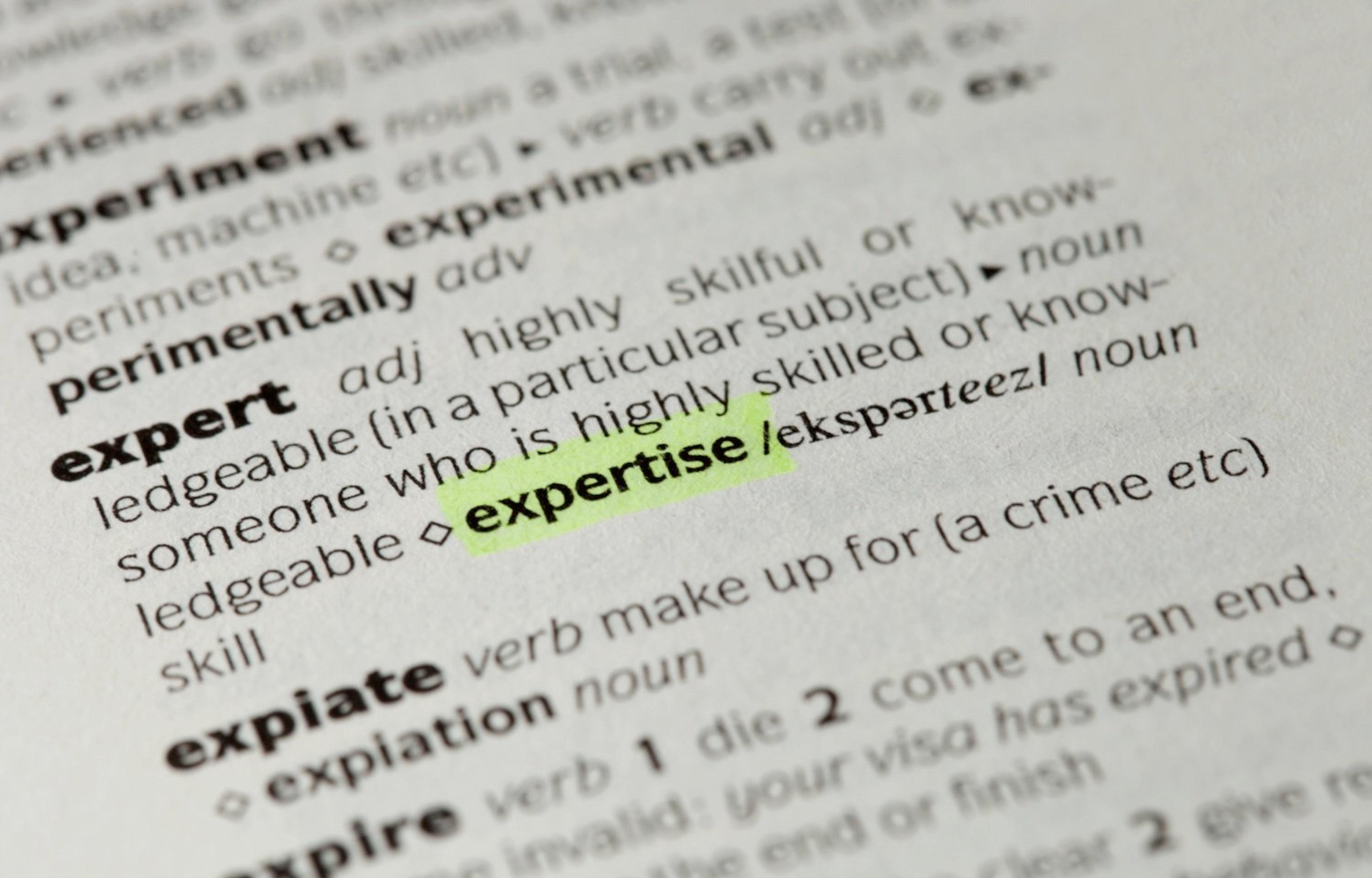
Table of Contents
Free Event

Featuring Melanie E.
How to Get a Head Start on Your MBA Application
Starting Wednesday, April 16
10:00 PM UTC · 60 minutes

Featuring Melanie E.
Why Should You Become an Expert?
Do I go broad, or do I go deep? This is a classic question I hear from clients (and friends).
Around the time I graduated from my bachelor’s program, I remember sitting in a car with my uncle. I told him I wanted to become an executive. That would be an exciting job; I would help run a company, orient teams, develop employees, and make tough business decisions.
He paused. “You know, typically when companies hire someone, it’s to fill a specific role.”
It was a simple statement. But it stuck with me.
You will see job descriptions out there that call for a jack of all trades. An athlete. Someone who can pick up a ball and run with it. But in my opinion, that’s bull.
Of course, if you can hire someone who can do anything well, why wouldn’t you? But it’s a hell of a lot easier to be exceptional at one or two things than to be pretty good at everything. It’s more marketable, too.
Harvard Business School admits 50% of the people they interview. If you are invited to fly, bus, or Zoom into one of these coveted thirty-minute conversations with a member of Harvard’s ad comm, you are good enough to go to HBS. They will gladly tell you that, and they mean it.
But they don’t accept everyone who is good enough to go to HBS. They accept half of those people.
A major role of the HBS interview is to suss out expertise. On average, a student will speak less than once per class in their Required Curriculum (first) year. The ad comm wants to make sure that those comments will be valuable to the other 89 students in the section.
In other words, they want you to know what you’re talking about.
In that admissions interview, they might dig into one niche topic on your resume and see if you understand it better than any other applicant.
It certainly isn’t wrong to be a jack of all trades. My point is that you may find proving you are right for that job, that promotion, or that seat in the class easier if you can point to something concrete and honestly say, “I am great at that.”
Given how easy it is to build expertise, it’s something worth considering.
How to Choose an Area of Expertise
As you think about what areas you want to focus on and begin building expertise in, consider the following questions:
1. Is it interesting to you?
First off, it doesn’t have to be. Not necessarily. Know yourself. Can you get interested in something just by going down a rabbit hole? If so, then disregard this section. But many of us need to feel interested in a topic to spend a lot of time researching it.
For some, it may help to at least find some connection to the topic. Perhaps a family member received poor access to healthcare, making that a topic that you care about. Maybe you were able to use airline miles to go on a cool trip and that motivates you to learn about trends in aviation. Pay attention to the potential topics to which you have connections.
Whether it’s genuine interest, intellectual curiosity, or an emotional connection, make sure that there is a reason you will stay motivated and be able to learn more than the typical person in the field. Without one of these, you may putter out.
2. Is the space crowded?
Some kinds of knowledge are commodities because so many people hold them. Before you invest your time into becoming an expert, find out if your expertise will differentiate you.
One way to seek out topics that will separate you from the herd is to go deeper.
While many finance professionals have the expertise to build financial models, far fewer have expertise in properly discounting cash flows across currencies. While there may be many front-end developers, few know what curveballs exist when developing software for corporate compliance.
Niches exist in seemingly crowded spaces where you can set yourself apart.
When I wanted to build expertise at Stanford in the crowded space of corporate finance, I found I had a lot of interest in bankruptcy and financial distress. I focused my interest by taking several classes on less popular finance topics and wrote a 30-page report on the new trends I found.
3. Does anyone care?
The flipside to finding a topic that isn’t crowded is finding a topic that isn’t so niche or dated that no one will care about it.
Controversial investor, Peter Thiel, said, “You could be the only British Nepalese fusion restaurant in Westwood but it doesn’t mean you’re going to see success.”
Consider your long-term goals when you pick areas to delve deeply into. Not only do you need a reason to care about the topic, but others do as well.
Work With an Expert
The best way to become an expert is to work with an expert! Whether you're trying to elevate your career, land a new job, ace a test, get into school, or anything else, we have 700+ vetted, expert coaches dedicated to helping you reach your goals. Below are some of our most popular career coaches, browse all of them here.
How to Build Expertise
Many management consultants and MBAs are criticized for being enthusiastic ignoramuses. Allegedly, they burst into a room having no knowledge of the matter at hand and demand respect for the accomplishments they accrued in entirely unrelated fields.
However, effective practitioners know how to develop and use expertise to lead from the front.
Although there is no right way to build expertise, it’s not difficult to find a strategy that works best for your circumstances. Below, I describe 4 paths to building expertise, from the slowest to the fastest strategies.
1. Slowly but Surely
Though it may not be the most glamorous strategy, don’t knock this approach. It works.
Show me someone smart and hardworking who has been in their industry for a decade, and I’ll show you someone who has major expertise in their field.
That’s not to say that you need to do something for ten years to achieve a level of mastery. Two or three years of focus on a niche is more than enough time to develop differentiated perspectives and knowledge.
If you decide that you will be the software engineer who champions automation projects, the analyst who will run diligence on investments in Latin America, or the HR generalist who will step up diversity, equity, and inclusion for your company, after a while, you will have encountered enough questions and wrestled with enough challenges that you will build up serious domain knowledge.
When people turn to you to have the answer or to be the one to find it, you are on your way to becoming an expert. Put yourself in a position to master a topic. As Warren Buffett said, "The difference between successful people and really successful people is that really successful people say ‘no’ to almost everything."
Figure out what you want to be an expert in, focus your time and attention on it, and you’ll find expertise right around the corner.
Ask for projects that cater to your desired area of expertise and be willing to put in the extra work to do them well. Find conferences relevant to your workplace and your area of expertise and offer to attend or volunteer for not-so-sexy tasks that could result in your ownership of a domain.
While this path isn’t the fastest one, there is a reason most job descriptions ask for a certain number of years of experience in a particular domain.
2. Find a Mentor
You don’t need to build expertise on your own; it’s okay to lean on someone else. Find an expert to teach you the ropes and cut years off of your learning.
Jim Donavan is Vice Chairman of Global Client Coverage at Goldman Sachs. When he gave advice on how to replicate how he built expertise covering clients as a banker he said, “What you should do is find someone at the firm in which you work… find someone who’s really good… and learn as much as you can from that person.”
Working regularly with an expert means you see the factors that they consider. This puts you in earshot of facts and anecdotes that may be relevant to you. If you are a good mentee, you can ask why your mentor does things a certain way. Their critiques of the perspectives you build will be orders of magnitude more valuable than the feedback you get from a novice or peer. Their insider knowledge will drastically cut down your expertise-building time.
Acquire mentors by identifying effective practitioners and adding value to them. Mentorship usually doesn’t happen overnight. While many companies intentionally pair junior staff with more senior leaders to promote mentorship, you can build a relationship with people at work or outside the office by offering to help them on a project, recognizing their success in private messages, or asking for their advice on specific questions. Over time, those loose relationships can ferment into meaningful bonds.
One of my earliest mentors at my first employer fell into that role because I helped him with his grammar. English wasn’t his first language. I suggested a few edits to make one of our client reports read more naturally. Soon, he would ask me to come to his office anytime he wrote an important email to a client. Editing his emails wasn’t particularly interesting work for me but it was valuable to him and it put us in a room together. Soon enough, he was asking me to be a part of some of his most interesting projects and I was learning from him and his boss daily.
3. Write a White Paper
Something that can focus your efforts to build expertise is to create a work product to memorialize your learning.
This is a popular option at Stanford’s Graduate School of Business. Students there can take up to six credits of independent study that count toward their degree. When I was at the GSB, I did two independent research projects that accelerated my learning in ways that a course designed for a classroom of students simply couldn’t.
This work product can take many forms and serve many purposes, all of which contribute to your knowledge of a particular subject.
Most consulting firms regularly produce research to demonstrate their expertise. Similarly, many start-ups, non-profits, and growing enterprises publish think pieces to establish their brand, drive traffic to their site, and improve their search engine rankings.
By raising your hand to help produce thought leadership in an area of interest to you, you can get resources, access to subject matter experts at your firm (see above), and an excuse to focus your time and attention on this topic. You may find that the deadlines associated with these kinds of reports are a helpful motivating force to keep you on track.
If you work at an investment firm or plan to pivot into investing, you can develop investment theses, industry landscape reports, or pitch an investment to focus your attention on a subject.
The process of researching, articulating your ideas, and responding to pushback will help you refine your perspective.
4. Online Research
Sometimes, time is not on your side but you still want to get smart on a topic quickly. The amount of knowledge that you can build in a week or two of dedicated research is surprisingly substantial.
Consultants do this all the time. They spend a couple of weeks doing expert interviews and reading research for a client engagement. They then show up to the project much better equipped than they otherwise would have been.
While not nearly as thorough as the strategies I laid out above, if you are in a bind and need to demonstrate expertise in a short amount of time, use the same tools as the consultants.
On one consulting project I worked on at McKinsey, I needed to quickly learn about a niche sector of consumer finance. We paid industry practitioners thousands of dollars to have brief calls with us to answer our questions about their sector. My team used that information to inform our recommendations to a large US bank. One of the most fruitful calls we had was with a friend of mine! I didn’t realize she was one of our experts until they got on the phone. If I needed that call for my own personal research, surely the friend would have spoken with me for free (or in return for me buying them lunch or a coffee).
Ask friends, colleagues, or even strangers if they will speak or share resources with you about a topic. Research with the goal of becoming an expert.
Identify a few case examples that demonstrate your knowledge. For example, if you plan to demonstrate expertise in the energy transition to renewables, have a few examples of public and private sector efforts to transition to renewable energy sources. Know the facts of the cases and develop a perspective on why certain efforts were or weren’t successful.
As I discussed above, it is more valuable for you to be able to go into depth about a small handful of cases than to know a little bit about a dozen cases. Expertise lives in the details.
You won’t make the Forbes 30 Under 30 List for the expertise you build in a week. But with enough research papers, equity analyst reports, YouTube videos, and conversations with practitioners under your belt, you’ll be well on your way to building a credible portfolio of knowledge. Start small, and build your way up.
To Conclude
Now, it’s time to start. What do you want to know more about than anyone else? It isn’t hard to be an expert. It just takes focus.
Whether you dedicate your life to being a full-time subject matter expert or you choose the path of jack of all trades and master of some, hopefully, you can weave expertise into your story.


















